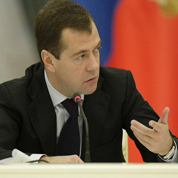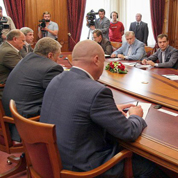Truly free and fair elections are essential for a functional democracy
Issue:
November 2009, Vol, 4 No. 10
Tags:
Elections

For the first in a decade, Russia’s so-called ‘managed democracy,’ by the way, one of the most effective in the post-Soviet region, ran into a hitch last month, when all but one political party decried the October 11 regional and municipal councils elections’ results as ‘fraudulent and predetermined.’ While discontent with election results by defeated parties is a norm, the unprecedented unison across the political spectrum — notably, the leftist Communist Party, moderate centrist Just Russia Party, the ultranationalist LDPR and the liberal Yabloko Party, etc. — in condemnation of the pro-Kremlin United Russia Party’s landslide victory actually raised a red flag over the elections’ fairness.
Indeed, the defeated parties’ strident cries of foul play, particularly emphasized by the mysterious disappearance of the Yabloko leader’s vote from the final results in the district, where the party allegedly got nil votes, are obvious indications of election irregularities. The interesting thing is that United Russia, with its strong political connections and high-profile membership, could have really won the elections with the declared margins. However, given the zealousness of the bureaucrats and their genetically ingrained traits to pleasing their leaders, it will not be far-fetched to assume that some could have probably ‘bent the laws’ in striving to deliver their regions to the ruling party.
This type of behavior is expected, taking into consideration the Soviet strongman Iosef Stalin’s electoral doctrine, which says ‘it does not really matter how the electorate votes, but how the votes are finally tallied.’ And, going by the recent election outcomes, it does seem that this Stalin-era principle is still much a ‘modus operandi’ in the votes tallying process. This is why the recent developments pose tangible threats to the existing political system, and hence the urgent need to diffuse the rising post-electoral tensions in the society.  Here, one needs to give kudos to the Russian president, who, displaying real statesmanship, met with the defeated parties’ leaders to discuss the election results so as ‘to prevent transforming the poll results into a burial of democracy’ in Russia.
Here, one needs to give kudos to the Russian president, who, displaying real statesmanship, met with the defeated parties’ leaders to discuss the election results so as ‘to prevent transforming the poll results into a burial of democracy’ in Russia.
 Here, one needs to give kudos to the Russian president, who, displaying real statesmanship, met with the defeated parties’ leaders to discuss the election results so as ‘to prevent transforming the poll results into a burial of democracy’ in Russia.
Here, one needs to give kudos to the Russian president, who, displaying real statesmanship, met with the defeated parties’ leaders to discuss the election results so as ‘to prevent transforming the poll results into a burial of democracy’ in Russia. Later, the president also met with Central Election Commission (CEC) Chairman Vladimir Churov, who is at the center of the alleged elections fraud scandal, and pointedly ordered him to use all the powers vested in his office by the state and other government resources to ensure that all the elections-related allegations are scrupulously investigated with the ultimate aim of giving each of them ‘a legal assessment.’ Otherwise, as the president put it, “the local political system will be going down the wrong direction.”
It is unlikely that the elections’ contested results will be annulled nationwide, despite some positive court rulings in certain cases. However, given the fact that de-facto free and de-juror fair election is the only civilized route of changing/influencing governments and political leaderships in modern democratic societies, the president should ensure that the declared competitiveness of political platforms, real party pluralism and the sanctity of every single vote, etc., become the norms in Russia.
Otherwise, all other forms of electoral processes — where the electorate’ political apathy and feeling of predetermination of election outcomes keeps most voters away from the polls — are poor imitations of a true democracy. This is why the government ought to know that it is its direct political responsibility to ensure that elective governance does not become a farce in Russia, a barefaced mockery of a bonafide democracy, which is traditionally defined as ‘a government of the people, by the people and for the people.’












 Web design,
Web design,